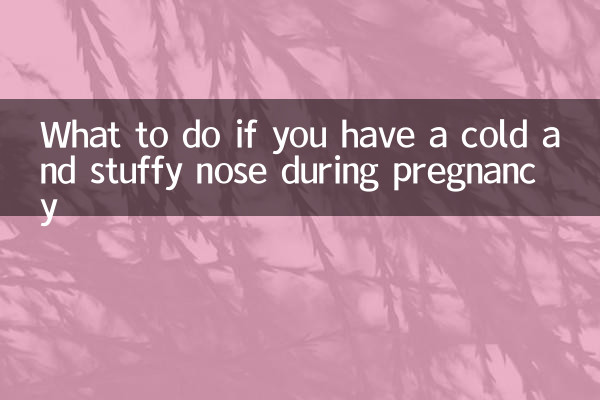What to do if you have a cold and stuffy nose during pregnancy
Colds and nasal congestion during pregnancy are a common problem for many expectant mothers. Since medication during pregnancy requires extra caution, many conventional treatments may not be applicable. This article will combine the hot topics and hot content on the Internet in the past 10 days to provide safe and effective relief solutions for pregnant mothers.
1. Common causes of cold and stuffy nose during pregnancy

| Reason | Description |
|---|---|
| Decreased immunity | During pregnancy, maternal immunity naturally decreases and makes the mother susceptible to viruses. |
| Hormone changes | Elevated progesterone levels may cause congestion and swelling of the nasal mucosa |
| environmental factors | Dry air, allergens and other external stimuli |
2. Security Mitigation Methods
1. Physical therapy
• Steam inhalation: 2-3 times a day, 5-10 minutes each time, add a small amount of salt
• Saline nasal irrigation: use a special nasal irrigation device or spray
• Hot compress: Apply a warm towel to the bridge of the nose
| method | Frequency | Things to note |
|---|---|---|
| steam inhalation | 2-3 times/day | The water temperature should not exceed 50℃ to avoid burns |
| Saline nasal rinse | Use as needed | Use medical saline |
2. Dietary conditioning
• Drink plenty of warm water: at least 8 glasses a day
• Honey lemon water: relieves throat discomfort
• Chicken broth: packed with nutrients and helpful in reducing inflammation
3. Medication precautions
| drug type | security | Remarks |
|---|---|---|
| antipyretics | Acetaminophen is relatively safe | avoid ibuprofen |
| antihistamines | Requires medical guidance | Some may affect the fetus |
| cough medicine | Use with caution | Containing codeine is prohibited |
4. When Do You Need Medical Treatment?
You should seek medical attention immediately if:
• Sustained high fever (body temperature exceeds 38.5°C)
• Trouble breathing or chest pain
• Severe headache or blurred vision
• Abnormal fetal movements
5. Preventive measures
• Maintain indoor air circulation
• Wash your hands frequently and avoid contact with people who have colds
• Get enough sleep
• Appropriate vitamin C supplementation
6. Expert advice
According to recent interviews with obstetricians and gynecologists:
1. Medication should be avoided as much as possible in the first trimester (first 3 months)
2. Consult an obstetrician before using any medicine.
3. Common colds usually heal on their own in 7-10 days, so there is no need to be overly nervous.
Conclusion
Although colds and nasal congestion are common during pregnancy, most of them can be successfully relieved with scientific and reasonable care. The most important thing is to maintain a good attitude and seek professional medical help in time when necessary to ensure the health of mother and baby.

check the details

check the details